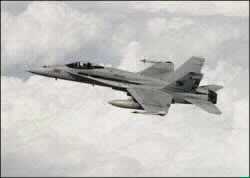Anglo-American Raid Overshadows Inspections in Iraq
02/12/2002| IslamWeb
 Iraq mourned four dead after a Western bombing raid, overshadowing the fourth day of UN arms inspections, as Britain and the United States prepared to defend their tough line against Baghdad. Hundreds of US military personnel were meanwhile setting up a hi-tech command centre in Qatar for war games in the emirate as the Pentagon stepped up deployments in the Gulf, but a British government spokesman insisted war was not the goal.
Iraq mourned four dead after a Western bombing raid, overshadowing the fourth day of UN arms inspections, as Britain and the United States prepared to defend their tough line against Baghdad. Hundreds of US military personnel were meanwhile setting up a hi-tech command centre in Qatar for war games in the emirate as the Pentagon stepped up deployments in the Gulf, but a British government spokesman insisted war was not the goal.
Twenty-seven people were wounded along with the four killed when US and British warplanes bombed "civilian and services installations" in Basra and two other southern provinces, an Iraqi military sopkesman said.
Residents of Basra had told AFP earlier by telephone that at least eight people were killed and 20 injured when Western jets bombed the premises of the Southern Oil Company.
Between 600 and 700 employees were in the buildings at the time of the raid some 560 kilometers (350 miles) south of Baghdad, according to residents who spoke on condition of anonymity.
The US Central Command also reported that US-British coalition warplanes bombed an Iraqi air defense site Sunday 274 kilometers (170 miles) southeast of Baghdad after Iraqi forces fired anti-aircraft artillery at coalition aircraft in the northern no-fly zone.
Baghdad, which refuses to recognize the air exclusion zones over southern and northern Iraq enforced by London and Washington since the 1991 Gulf war, regularly accuses them of targeting civilian facilities.
The raids came as Iraq accused the United States and Britain of looking for any pretext for war, despite the successful relaunch of UN disarmament checks last week.
"Their aim is not to verify that Iraq no longer has these weapons but to find any excuse to attack," the ruling Baath party daily Ath-Thawrah charged.
"The UN teams have found nothing in recent days and will find nothing in coming days."
UN experts visited a crop-spraying facility and factories for missile casings and aircraft engines Sunday, after incident-free inspections Wednesday, Thursday and Saturday.
In Khan Bani Saad, some 25 kilometres (15 miles) southeast of the capital, one team inspected crop-dusting aircraft at an agricultural ministry facility which had housed the secret "Zubaidi" project for aerosol delivery of chemical and biological weapons before 1991.
A second group of inspectors visited the bin Firnass and al-Quds plants in the huge al-Taji compound northeast of the capital, both of which have been involved in the production of the Samud short-range missile, which UN rules still allow Baghdad to possess.
It was unclear whether the visits were no-notice inspections or visits to restore monitoring equipment left by the previous UN mission withdrawn in 1998.
UN spokesman Hiro Ueki acknowledged that Iraqi officials were told in advance about two of the visits Saturday so they could help with the repair of surveillance gear.
The head of the International Atomic Energy Agency (IAEA), which is conducting the inspections along with the UN Monitoring, Verification and Inspection Commission (UNMOVIC), cautioned there was still a long way to go before Iraq could be deemed to have disarmed.
"We are off to a good start but we are still far from reaching a conclusion," Mohamed ElBaradei told the BBC.
It was a point taken up by the British government's Iraq spokesman, Mark Sedwill, as he defended the allies' tough line.
The "first really substantial test of Iraq's intentions to comply" would not come until December 8, when Iraq is required to give a "currently accurate, full, and complete declaration of all aspects" of its weapons of mass destruction programmes, he told reporters in the Jordanian capital Amman.
Announcing that Foreign Secretary Jack Straw would release a report in London on Monday detailing Baghdad's human rights abuses, Sedwill denied that Britain was warmongering.
"We don't want a military conflict but we want a peaceful outcome to this and we have a way to achieve it if Iraq takes it."
Two US envoys meanwhile headed to Europe for a marathon 10-nation tour as Washington stepped up contingency plans for military action.
Pentagon number two Paul Wolfowitz and State Department number three Marc Grossman were due to begin with stops in key ally Britain, where Wolfowitz was to address the International Institute for Strategic Studies Monday, and NATO headquarters in Brussels.
Washington is also prepositioning hundreds of tanks, Bradley fighting vehicles and other hardware in the emirate at a cost which the New York Times put at more than 100 million dollars.
The Washington Post meanwhile put the cost of a full-fledged invasion and occupation of Iraq at as much as 200 billion dollars, more than double the 80 billion cost of the 1991 Gulf war.
If the fighting was protracted and Saddam blew up Iraq's oil fields, the indirect costs could be even greater, reverberating through the US economy for years, the paper said.
PHOTO CAPTION
A US F-18 warplane flies over southern Iraq.
www.islamweb.net
